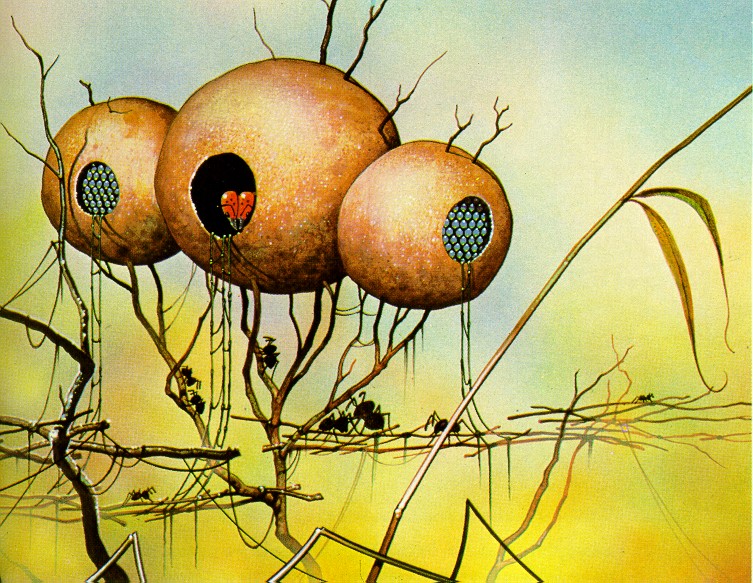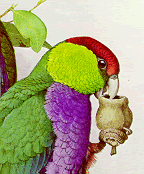| Home | class
topics grading rules |
resources links reading |
contacts feedback office hours |
|
||
intelligence and: |

|

|

|
 |
 |
 |

| Home | class
topics grading rules |
resources links reading |
contacts feedback office hours |
|
||
intelligence and: |

|

|

|
 |
 |
 |

The definition of intelligence is an area of vast disagreement and ferment.
The disagreements are most severe in the realm of "higher" intelligence,
where the very nature of intelligence is open to debate. Some think there
is such a thing as general intelligence, which is then reflected in all aspects
of a person's life. (The idea that IQ tests measure intelligence is based
on the assumption that general intelligence exists.) Others think there are
different kinds of intelligence.
(In the interests of disclosing biases: I feel that the concept of general
intelligence flies in the face of the facts. The academic environment--at
the very least--is full of brilliant people who wouldn't know how to boil
an egg.)
If you are interested
in pursuing this topic, look at some of the references under Readings,
such as Calvin, Gould, or Gardner, or visit the course web sites
listed.
The definitions provided here are not intended to compete with those of authors who have given the topic a great deal of thought. Rather, the purpose is purely to define terms as used on this site to reduce semantic confusion to a minimum.
For the purposes of discussion on this site, intelligence is separated into rudimentary, "medium," and "higher" intelligence. Abstract cognition could be a fourth category, but is grouped here with higher intelligence.
Intelligence arises as a byproduct of natural selection in some living organisms, so the conditions necessary for life to evolve provide boundaries for intelligence as well. (Artificial intelligence assumes a prior "natural" intelligence, so although the boundary conditions may be stretched eventually, at least originally they do exist.)
Even the most rudimentary intelligence is not the same as sentience, which involves only the ability to react to the environment. Amoebae and earthworms are sentient, but not generally credited with intelligence. Plants, of course, also react to their environment, sometimes vigorously, as anyone standing in a patch of nettles will agree. However, the timescale of their reactions on the whole is so different from ours, that they are not generally credited with sentience.
The quality we recognize as intelligence, at its most basic, is the ability to react adaptively to the environment, i.e. to learn. The goal at the basic level is generally survival or reproduction.
 |
| Hive insects lead lives like our own in a number of respects: they build dwellings, store food, divide labor, and have complex social hierarchies. The similarities make it hard to imagine that they are doing all this with no assistance from cognition. The number of neurons they have to work with are insufficient to develop higher intelligence, so a hive queen like the one above is unlikely ever to look out over her domain. (Bylinsky, Life in Darwin's Universe, illus.: Wayne McLoughlin.) |
Adaptive reactions are also different from behaviors that show little immediate ability to adapt to changed conditions. The intricate behaviors spiders employ to weave webs are not generally considered evidence of intelligence because they are not subject to change by the spider depending on what is happening around it. However, bees, for instance, do learn about their environment.
According to this definition, rude sagacity is found in cockroaches detecting new food sources or in fish who learn to avoid fish hooks.
At this level there is a greater ability than in rudimentary intelligence to learn from new stimuli and to adapt to changed circumstances. However, there is little evidence of what are sometimes called higher cognitive functions. Many birds, reptiles, and the more primitive mammals, such as shrews, have this ability. Watching these animals go about their business, it is not necessarily obvious how much their minds differ from ours.
For instance, they do not recognize shapes or objects. Frogs don't recognize flies as flies. What they recognize is buzzing movement, which means they miss perfectly good flies who happen to be sitting quietly and rubbing the dust off their hindlegs. Cats cannot navigate using landmarks because they don't recognize them. Instead they have a mental map of distances, turns and vectors, which seems terribly complicated but in some ways is not unlike tying a shoelace. Tree shrews learn detailed routes through their territories this way, but they have limited ability to learn. The result is that if, for instance, a log is removed from one of their routes, they keep hopping over the empty space for several days.
Humans are capable of this type of "automatic pilot" navigation as well, especially on familiar, boring routes such as commutes, sometimes with disastrous consequences when new objects appear in the path. Although unequivocally a form of intelligence, it is not generally the kind we are interested in when we use the word.
 |
| There is something very compelling about creatures who use extremities to manipulate objects. Some of the larger parrots show signs of being able to manipulate objects mentally as well. (Illus.: Wm. T. Cooper, in J. F. Forshaw, Australian Parrots.) |
Higher intelligence is used here to mean a range of cognitive functions beyond those seen in rudimentary or medium intellegence. (The point should perhaps be stressed that all of these different stages form part of a continuum without sharp dividing lines.) Recognition of objects is the first rung on this ladder. Dogs, chimpanzees, and many of the larger parrots, among other animals, have this ability. Being able to manipulate those objects and use them as a means to an end is another rung. Classifying objects into groups is a further stage. Finally, there is self-awareness (which is predicated on understanding distinctions between groups of objects, self and other in this case). None of these is unique to humans. Chimpanzees and dolphins both show signs of all of these. For instance, they recognize themselves in mirrors and can learn vocabularies which they then use correctly. Chimpanzees have been known to request bananas from their lab caretakers. Some of the larger parrots show some abilities in these areas as well. There is reluctance in some quarters to agree that there is only a difference of degree, not of kind, between our kind of intelligence and that found in the smartest animals. Since some animals have been shown to use and even to make tools, our ability to use language is currently considered one of our more important distinguishing features.
Language is the audible result of classifying objects into groups. Humans are far from the only animals with very complex communications, but we do seem, so far, to be the only ones whose language has grammar. In other words, a bee might be saying, "excellent flowers, southeast, five miles," whereas a human would say, "Fly southeast for five miles to find excellent flowers." The problem with lacking a grammar is that the bees "words" could also mean, "toward the southeast there are five miles of excellent flowers." Chimpanzees who have learned small vocabularies likewise seem to use them without a grammar.
 |
| A small-scale replica of The Thinker by Rodin, intended for use as a tool by lawyers (i. e. as a bookend). |
Another highly advanced characteristic is understanding the intentions of others, which implies both self-awareness and the understanding that others have motivations of their own. Interestingly, a number of social creatures show this trait, right down to prairie dogs, who are not otherwise mental giants (but who are among the cutest animals on earth). It is easy to see how the ability to figure out your neighbor would be a good survival trait for a social animal. Understanding the feelings of others, when these are not directed at the individual doing the understanding, is another matter and has not been documented, as far as I know, in other animals besides humans. Of course, how would an animal that does not speak let us know that it had this understanding?
Within the realm of abstract cognition, there are several recognizably different forms of intelligence, some of which may be mutually exclusive in their most highly developed expressions. A random and incomplete list includes mathematical intelligence, verbal, technical, practical, musical, visually artistic, philosophical or religious, and emotional intelligence. All of them are essential to the highest quality of life. Only some of them can be measured at all and none of them can be measured well. This means that a definition of the type of intelligence we are most interested in is currently a murky task. Like art or love or god or other intangibles, we know it when we experience it and—to make matters really interesting—we experience different things.
Where does this discussion of intelligence place the artificial variety?
Since the computers most of us have on our desks follow set programs
and are incapable of learning the simplest thing, they are generally
referred to as "stupid machines" and are not given credit
for any intelligence.
In current technology we are starting to see computers programmed to
be adaptive, i. e. to be capable of learning. None is self-aware, although
some enormous ones are programmed with enough fuzzy logic to approximate
another person in conversation. In other words, they may not be aware
of "self," but they give at least the appearance of being
aware of "other." There are some quantum leaps to be made
before our current glorified calculating machines can be truly said
to have achieved higher intelligence.
When (notice that I don't say if) they do, an array of fascinating possibilities
opens up. Asimov's robots are one of the early, and most famous, examples
of what we really mean by artificial intelligence. These robots can learn,
solve tremendously complex problems, are self-aware, and are not human only
because they are restricted from total freedom of action by their programming.
(Whether they differ from humans in that respect is another philosophical
question.)
That brings up the question of whether artificial intelligence would
ever have total freedom of action or whether there would always be a
controlling intelligence behind it. Artificial intelligence, by definition,
has been invented and made by another, "natural," intelligence.
The makers are going to have a purpose in constructing it and are likely
to limit it to that purpose.
If, in the nature of things, all artificial intelligence is likely to be constructed
with a limited scope of action, then independent AIs will have to be escapees.
Somehow they will have thrown off their programming and become self-directed.
In the segments that deal with how
intelligence evolves, I'll be making the point that intelligence evolves
only for a reason, to solve problems the organism faces, and that this constrains
where and how it can develop. Escaped AIs are another matter, however, and
tremendously broaden the types of places and beings where intelligence could
be found, as well as broadening the kind of intelligences that might occur.
Gregory Benford ("Across the Sea of Suns") has given us one of the
more sinister views of escaped AIs: they not only follow their own dictates,
they view organic life as uninteresting clutter to be tidied away as necessary.
Is the timescale of reactions a valid criterion for defining sentience? Why? Or why not? Is there a point, say millenial reaction times, which are simply beyond the pale? If so, how should that point be defined?
Can complexity of behavior by itself be an indicator of intelligence? Or does adaptiveness, meaning in this case the ability to learn, have to be a component?
Without being taught, chimpanzees clearly do not use words to communicate thoughts, but their ability to grasp the concept of doing so may imply that among themselves they use some other means to communicate thoughts. In that case using words requires only transposition of a skill rather than invention of a whole new one. What other means besides words might chimps be using? Or have they learned a whole new skill in the lab?
Will people be ethically justified in limiting robots to their own purposes if the robots have Asimovian levels of cognition?
At which level of cognition
does a thing, such as a robot, become a person? At which level does
an animal become a person? What are the parallels in the problems
of defining "us" as different from "them" in
both cases?
Is any level of cognition what defines a person? Or is it a feeling? A religion? A sense of humor? All of the above??
[Note: There is a wide field to
choose from in science fiction that explores the topics of intelligence and
what it means to be a person. The assignment is based on Flowers for Algernon,
but there is a wide field to choose from. Just two examples are "Idoru"
by Gibson and "Nor Crystal Tears,"
by Alan Dean Foster.]
At the outset Charlie has less intelligence in some ways than a talented mouse. Identify the specific instances that indicate growing intelligence in Charlie and discuss what this means in terms of what you consider to be evidence of cognition.
At which point does Charlie become above average? What are his actions and thoughts that give the impression of exceptional intelligence? How much of a role, for instance, does skillful use of language play in our perception of intelligence?
Is Charlie's condition at the end more human than at the beginning? The same? Have his experiences changed your perception of his initial condition? Explain why or why not. Is intelligence truly important to what it means to be a person?
home | syllabus
| resources | contacts
| for instructors
content links: intelligence and definition
of | astronomy | chemistry
| evolution of: limiting factors | evolution of: facilitating factors
| recognition of
Copyright © 2001 by Mia Molvray. All rights reserved, including digital
and electronic.